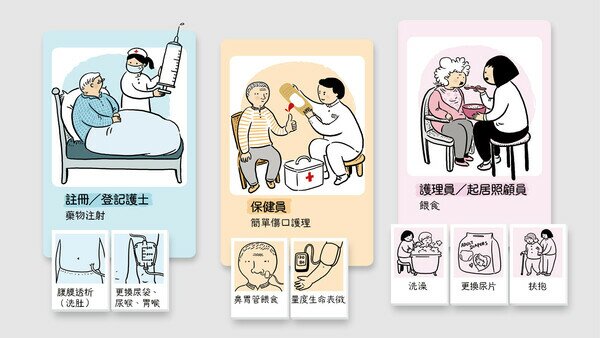Many chronic patients and elderly people require specialist home care services but given that family members may not have the time or medical knowledge to cater for their needs, home care service agencies become an alternative to homes for the elderly in providing required services in the comfort of home. However, in a survey conducted by the Consumer Council on 12 agencies offering home medical and personal care services, it revealed a wide difference amongst these agencies in types of services provided, scope of services, areas covered as well as service charges. The price variation was found to have no direct relationship with nature of the intermediaries, irrespective of whether they were social enterprises or private companies. In choosing such services, consumers should check whether the personnel who provide the services have the relevant professional qualifications, such as registered nurses, enrolled nurses or physiotherapists to ensure the home care services can facilitate the rehabilitation of the patients at a critical time.
The Council sent questionnaires to 26 home care services intermediary agencies to collect information on the services they provided and their service charges. Of the 12 agencies that eventually responded, 4 were private companies and 8 were self-financing social enterprises or charity organisations.
Among these agencies, 6 specialised in caring for stroke patients, 4 for bone fracture patients, and 4 for Alzheimer’s disease. The survey revealed that 4 agencies required a referral by a doctor before being appointed for service; and 3 agencies first arranged a home interview to devise a suitable home care proposal. Consumers should therefore base their choice of service provider on the patient’s needs.
The companies mainly provided service personnel, including registered and enrolled nurses, physiotherapists, occupational therapists, health workers and personal care workers, and based their charges on qualifications and hours of service. The services were charged on an hourly basis but some services had a minimum service time from 30 minutes to 4 hours. The price variation was the biggest for physiotherapist services with 9 companies offering the service at an hourly rate of $500 to $2,500, showing a significant difference of 4 times.
For relatively simple jobs like cleaning and dressing wounds by health workers, all but 1 of the 12 companies offered the service at an hourly rate of $100 to $320. All of them set minimum service hours with 2 hours for 7 agencies, 3 hours for 2 agencies and 4 hours for 2 agencies.
Consumer should take note that even when choosing the service personnel at the same rank, the scope of services provided by each company is different. Of the 12 companies surveyed, most of the personal care workers provided services for personal hygiene, such as bathing assistance and changing diapers, etc. 2 companies offered additional services, such as undertaking household chore and providing emotional care. Most of the companies required a Health Worker Programme for services like wound care, handling urine bags/stoma bags, and stomach tube feeding. Consumers should ask about the individual training and professional skills of the health workers as that may vary from one to another. Before choosing the services, consumers should ask for details and conduct evaluation to determine the appropriate service scope.
The survey also found that there was no direct relationship between the charges and the nature of the agency irrespective if the agency is a private company or a social enterprise. For registered nurses, for example, private organisations charged between $200 and $500 per hour while social enterprises and charity organisations charged between $520 and $1,000. In the case of physiotherapists, the hourly rate charged by private companies could be as high as $2,500 per hour while social enterprises and charity organizations charged at the most $1,800 per hour.
With regard to the method of payment, 11 companies accepted payment upon the completion of each service. 5 of them also offered a service package, ranging from one and a half month to 6 months with average hourly rates generally lower than the charge per each service.
All 12 agencies levied surcharges for services in remote areas or on special days. For services in remote areas, 4 companies imposed a surcharge of $30 to $100 for each visit, and 2 companies charged an extra 1 hour service fee. For services on special days, such as Chinese New Year or Sunday, 4 companies doubled the prices.
Individual agencies might offer more or less similar services but they might differ from each other in the details. For instance, 7 companies could provide either registered or enrolled nurses but only 5 could provide injection service, and only 4 could perform peritoneal dialysis.
Consumers choosing home care services should pay attention to the following:
- When employing professionals such as nurses, physiotherapists or occupational therapists, make sure the personnel sent by the agencies have the relevant professional qualifications;
- Some companies only provide services in specific areas and at specific time. For instance, some do not provide service on Saturday or Sunday while some offer 24-7 service;
- Consumers should take note of the terms of service regarding inclement weather. Some companies offer business as usual with a surcharge while others may cancel the service with or without a charge;
- The service booking also varies from one company to another with the shortest 2 hours booking to the longest 2 weeks booking in advance. Whenever possible, consumers should make the appointment for service well in advance.
The Consumer Council reserves all its right (including copyright) in respect of CHOICE magazine and Online CHOICE.



